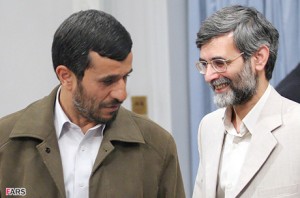 Robert Wright writes for The New York Times:
Robert Wright writes for The New York Times:Are you anti-Israel? If you fear that, deep down, you might be, I have important news. The recent tension between Israel and the United States led various commentators to identify hallmarks of anti-Israelism, and these may be of diagnostic value.
Israel Special: Obama-Netanyahu Meeting and the Settlement “Surprise”
As you’ll see, my own view is that they
aren’t of much value, but I’ll leave it for you to judge.
Symptom no. 1:
Believing that Israel shouldn’t build more settlements in East Jerusalem.President Obama holds this belief, and that seems to be the reason that Gary Bauer, who sought the Republican presidential nomination in 2000,
deems Obama’s administration “the most anti-Israel administration in U.S. history.” Bauer notes that the East Jerusalem settlements are “entirely within the city of Jerusalem” and that Jerusalem is “the capital of Israel.”
That’s artful wording, but it doesn’t change the fact that
East Jerusalem, far from being part of “the capital of Israel,” isn’t even part of Israel. East Jerusalem lies beyond Israel’s internationally recognized, pre-1967 borders. And the common assertion that Israel “annexed” East Jerusalem has roughly the same legal significance as my announcing that I’ve annexed my neighbor’s backyard. In 1980 the United Nations explicitly rejected Israel’s claim to possess East Jerusalem. And the United States, which normally vetoes U.N. resolutions that Israel finds threatening, chose not to do so in this case.
In short, accepting Gary Bauer’s idea of what it means to be anti-Israel seems to involve being anti-truth. So I don’t accept it. (And if you’re tempted to accept the common claim that Israel is building only in “traditionally Jewish” parts of East Jerusalem, a good antidote is
this piece by Lara Friedman and Daniel Seidemann, published on Foreign Policy Magazine’s excellent new
Middle East Channel.)
Symptom no. 2:
Thinking that some of Israel’s policies, and America’s perceived support of them, might endanger American troops in Iraq and Afghanistan (by, for example, giving Jihadist recruiters rhetorical ammunition). This concern was
reportedly expressed last week by Vice President Joe Biden to Prime Minister Bibi Netanyahu. And General David Petraeus is
said to worry about the threat posed to American troops — and to America’s whole strategic situation — by the perception of American favoritism toward Israel.
Identifying threats to American troops is part of a general’s job, and it seems to me Petraeus could honestly conclude — without help from dark “anti-Israel” impulses — that some of those threats are heightened by the Israel-Palestine conflict and America’s relationship to it. But Max Boot,
writing on
Commentary’s Web site, seems to disagree; if Petraeus indeed holds such opinions, that’s a sign of “anti-Israel sentiment,” in Boot’s view.
Now, for a lionized American general to even hint that America’s stance toward Israel might threaten American troops is a serious public relations problem for Boot’s ideology. That, presumably, is why Boot tries to show that this “anti-Israel” view, though
attributed to Petraeus, is not in fact Petraeus’s view. Specifically, Boot aims to discredit journalists who attributed this quotation to Petraeus: “The [Israel-Palestine] conflict foments anti-American sentiment, due to a perception of U.S. favoritism for Israel … . Meanwhile, Al Qaeda and other militant groups exploit that anger to mobilize support.”
Boot assures us that this passage, far from being a good guide to Petraeus’s thinking, was just “pulled from the 56-page Central Command ‘Posture Statement’ filed by his staff with the Senate Armed Services Committee”. Well, I don’t know who did the filing, but
the document itself is titled “Statement of General David H. Petraeus … Before the Senate Armed Services Committee.” So I’m guessing it’s a fair guide to his views — in which case, by Boot’s lights, Petraeus is anti-Israel, right? And in which case I’ll reject Boot’s criterion for anti-Israelism.
Boot has an ally in Abraham Foxman, the national director of the Anti-Defamation League. Foxman
said the perspective attributed to Biden and Petraeus “smacks of blaming Jews for everything.”
Foxman’s claim may seem hyperbolic, but look at it this way: If he can convince us that blaming any Israeli policy for anything is akin to blaming Jews in general for everything, then anyone who criticizes an Israeli policy will be deemed anti-Semitic — and fear of that label will keep everyone from criticizing Israel. And by virtue of never criticizing Israel, we’ll all be “pro-Israel.” And that’s a good thing, right?
Actually, it seems to me that if we were all “pro-Israel” in this sense, that would be bad for Israel.
If Israel’s increasingly powerful right wing has its way, without constraint from American criticism and pressure, then Israel will keep building settlements. And the more settlements get built —
especially in East Jerusalem — the harder it will be to find a two-state deal that leaves Palestinians with much of their dignity intact. And the less dignity intact, the less stable any two-state deal will be.
As more and more people are realizing, the only long-run alternatives to a two-state solution are: a) a one-state solution in which an Arab majority spells the end of Israel’s Jewish identity; b) Israel’s remaining a Jewish state by denying the vote to Palestinians who live in the occupied territories, a condition that would be increasingly reminiscent of apartheid; c) the apocalypse. Or, as Hillary Clinton put it in addressing the American Israel Public Affairs Committee conference on Monday: “A two-state solution is the only viable path for Israel to remain both a democracy and a Jewish state.”
So, by my lights, being “pro-Israel” in the sense embraced by Bauer, Boot and Foxman — backing Israel’s current policies, including its settlement policies — is actually anti-Israel. It’s also anti-America (in the sense of ‘bad for American security’), because Biden and Petraeus are right: America’s perceived support of — or at least acquiescence in — Israel’s more inflammatory policies endangers American troops abroad. In the long run, it will also endanger American civilians at home, funneling more terrorism in their direction.
The flip side of this coin is that policies that would be truly good for Israel (e.g., no more settlements) would be good for America. In that sense, there’s good news for Bauer and Boot and Foxman: one of their common refrains — that Israel’s and America’s interests are essentially aligned — is true, if for reasons they don’t appreciate.
Sadly, the Bauer-Boot-Foxman definition of “pro-Israel” — supporting Israel’s increasingly hard-line and self-destructive policies — is the official definition. All major American newspapers, so far as I can see, use the term this way. AIPAC is described as “pro-Israel”, but the left-of-AIPAC
J Street isn’t, even though its members, like AIPAC’s, favor policies they consider good for Israel.
No doubt this twisted use of “pro-Israel”, and the implied definition of “anti-Israel”, keeps many critics of Israeli policies from speaking out — Jewish critics for fear of seeming disloyal, and non-Jewish critics for fear of seeming anti-Semitic.
So, if I’m right, and more speaking out — more criticism of Israel’s current policies — would actually be good for Israel, then the newspapers and other media outlets that sustain the prevailing usage of “pro-Israel” are, in fact, anti-Israel. I won’t mention any names.
Postscript: It has been reported that, notwithstanding accounts in Israel’s media, Biden did not, in fact, complain to Netanyahu in private about the threat of Israel’s policies to American troops. Perhaps predictably, the journalist who first reported this is the Atlantic’s Jeffrey Goldberg, who has been described by one New York Times columnist as Netanyahu’s “faithful stenographer.” I don’t doubt that Goldberg found an administration source who downplayed Biden’s remarks to Netanyahu; obviously, once tensions started to subside, and the goal of both America and Israel was to smooth relations, it wasn’t going to be hard to find an administration official who would do that, regardless of the truth about what Biden said. So I attach little significance to the administration’s revisionist account of what transpired between Biden and Netanyahu — especially given the heat the administration no doubt took over the original account of what transpired.
 Thursday, March 25, 2010 at 13:38
Thursday, March 25, 2010 at 13:38  UPDATE 1345 GMT: Laura Rozen of Politico has just posted a different view of the Israeli Prime Minister:
UPDATE 1345 GMT: Laura Rozen of Politico has just posted a different view of the Israeli Prime Minister: 




